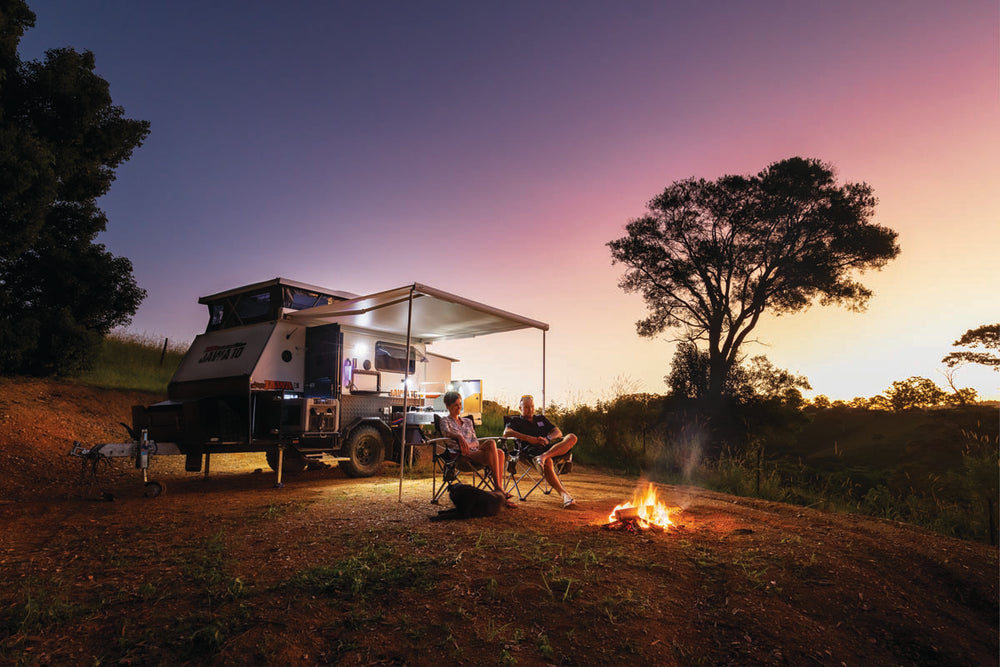Packing your caravan: what to take
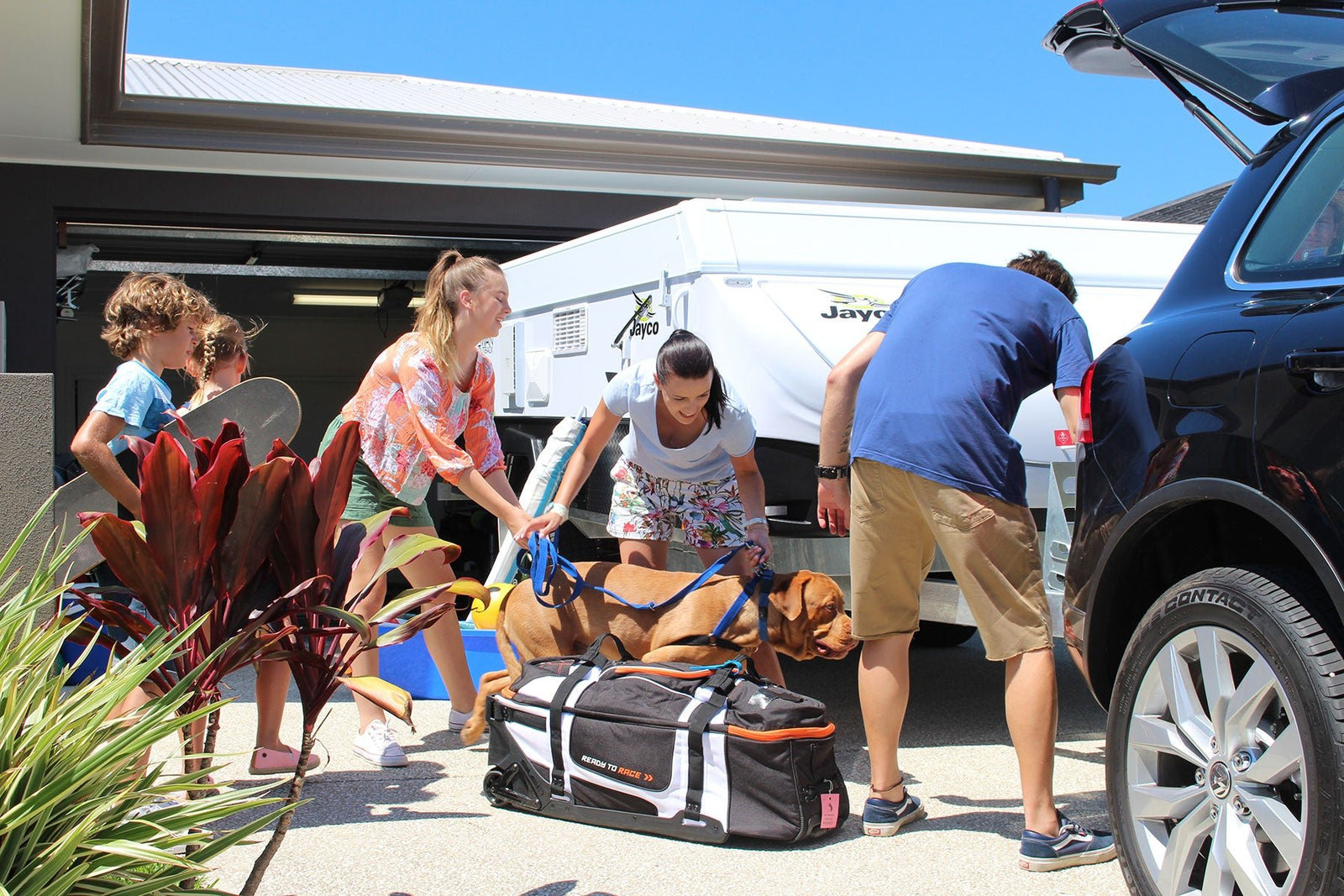
Caravanning is a great way to practice minimalism — let’s face it, most of us don’t have the space to cart around heaps of unnecessary stuff with us so embrace your inner Marie Kondo — if it doesn’t bring you joy or have a useful purpose in your van, leave it at home.
There’s nothing quite like the sense of freedom when you’re travelling our great land, exploring places you’ve never been and towing your home around with you.
Everything is so much simpler and, with limited space, caravanning is a great way to reduce clutter from your life.
As occasional school-holiday caravanners, we fell into the dreadful habit of ‘storing’ things in the caravan when they were no longer needed in the house. When we cleaned out our first Jayco Expanda in preparation for sale we found, among other things, six pairs of tongs, dozens of stubby holders, and enough torches and head lamps to light up the Sydney Opera House.
Becoming a caravanner comes with it a temptation to take with you on your first few trips away every creature comfort that you enjoy at home — coffee machine, blender, air fryer, enough clothes to account for everything from blizzards to tropics, hair dryer, lap top, books, games … the list goes on. And that’s just inside the van.
Here’s the reality. One, you don’t have space for all that stuff. Two, you probably don’t need at least two-thirds of the stuff you think you need. Paring down to just the basics is a skill learned over time and, once mastered, is quite liberating. Talk to any vanners who have been on the road for years, especially those who live in their caravans full time. They have minimalism down to a fine art.
And when you have to be cognisant of your payload, after taking into account water, gas, fuel and other essentials, there’s often not many kilos to play with.
Here’s a few tips for packing for a trip away.
Clothing
How much, or little, clothing to pack can be a challenge. Consider a few questions.
How long will you be gone? What will the weather be like? Will you have ready access to washing facilities in caravan parks or town laundromats? How much storage/hanging space do you have? Will you be going out for dinner or just barbecuing at the van?
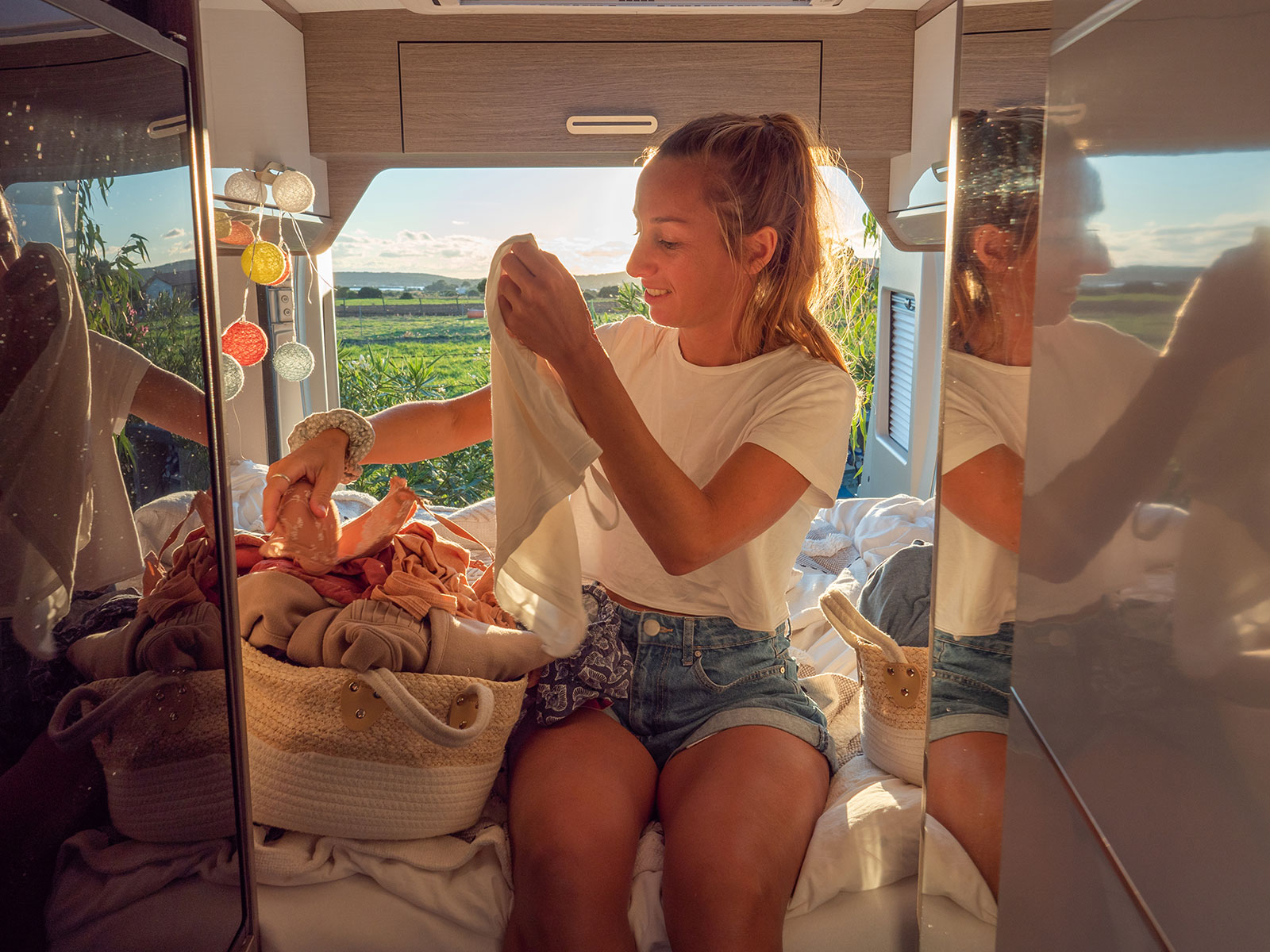
The clothes you pack should be hard-wearing, versatile, functional and have multiple uses. You may need coverage for a broad range of weather conditions in which case layering is the key. Thermal underwear, some merino base layers and a shell jacket will keep you just as warm as a bulky puffer. The expensive performance fabrics found at many popular brand stores do live up to the hype, but they are very tough on the hip pocket. Tip – if you’re heading for cold climes, try the HEATTECH products available at Uniqlo which are very good value for money. Fabrics that are easy to wash, quick to dry and will pack up without crushing are key.
Some people will set out on long trips carrying only a few summer clothes in the warmer months, then as the seasons change, they’ll donate them to the local op shop and pick up a new wardrobe at minimal cost.
Good walking shoes and a hat are a must and I usually take one ‘good’ outfit – perhaps a dress that doesn’t crush – in case of opportunities to posh it up a bit.
One of the best techniques for cutting down on weight is to get rid of anything you’ve packed because you might use it. If you’re not 100 per cent convinced of its usefulness on the trip, then don’t bring it.
Food and cooking
When it comes to cooking and dining in your van, light is best. Try not replicate every drawer you have at home in the van to take with you. Camping-specific gear, such as collapsible bowls, pots, even kettles, are excellent weight and space savers.
Some appliances are essential such as a kettle and toaster and I know some folks won’t leave home without their coffee machine. Which is fine; if you are going to use it — take it. But if there’s even a slight chance it will spend weeks being shuffled around the van without much use then leave it at home.
For dinner and glassware, acrylic, melamine and plastic don’t weigh much, and you don’t have to worry about them breaking while you’re on the road. And just carry enough of everything for the people who are travelling – it doesn’t make sense to cart around 10 dinner plates when there is only two of you.
The weight of frypans and saucepans adds up quickly. Just take what you need. If you are on the road and find yourself yearning for something you’ve left at home, just pop into a local op shop and you’ll be sure to find a replacement.
When it comes to packing food for a trip away, consider these few questions. How big is your fridge and freezer? Will you have ready access to a supermarket or do you have to take all your food with you? What will the weather be like?
Vacuum sealing meat, fish and vegies is a great way to keep them fresh for up to five times longer than normal. Once sealed, meat and fish can go into the freezer. And having a supply of vegies is great when salad things don’t last very long in the fridge. I will often add corn on the cob, broccolini and slices of sweet potato to the barbie when the lettuce has run out. Vacuum sealing machines are readily available and usually pop up at Aldi a couple of times a year.
I also pre-cook meals such as bolognese sauce or curries, vacuum seal and freeze them. When you’re on the road, grab a meal out of the freezer, defrost and when it comes time to reheating, pop the entire plastic bag into boiling water — it saves washing up a dirty pot.
Canned fruit and vegies are great if going off grid, and a couple of cans of baked beans or soup are useful if you are caught short, but consider the weight. Don’t pack heavy cans of food, pots and pans in high cupboards; leave them for lighter items such as biscuits and cereal. Many vans have centrally located storage, such as under the kitchen bench and under dinette seats.
Dehydrated foods are great weight and space savers too. Dried mushrooms are terrific — with some arborio rice, stock cubes and a bit of parmesan cheese, you have a restaurant-worthy risotto.
When it’s a long way between towns and supermarkets, take advantage of local markets and farm gates for fresh food — the produce is usually delicious and you are supporting a local farmer. Foraging is great too. More than once I have feasted on plums, apples and figs picked from trees while cycling along a rail trail.
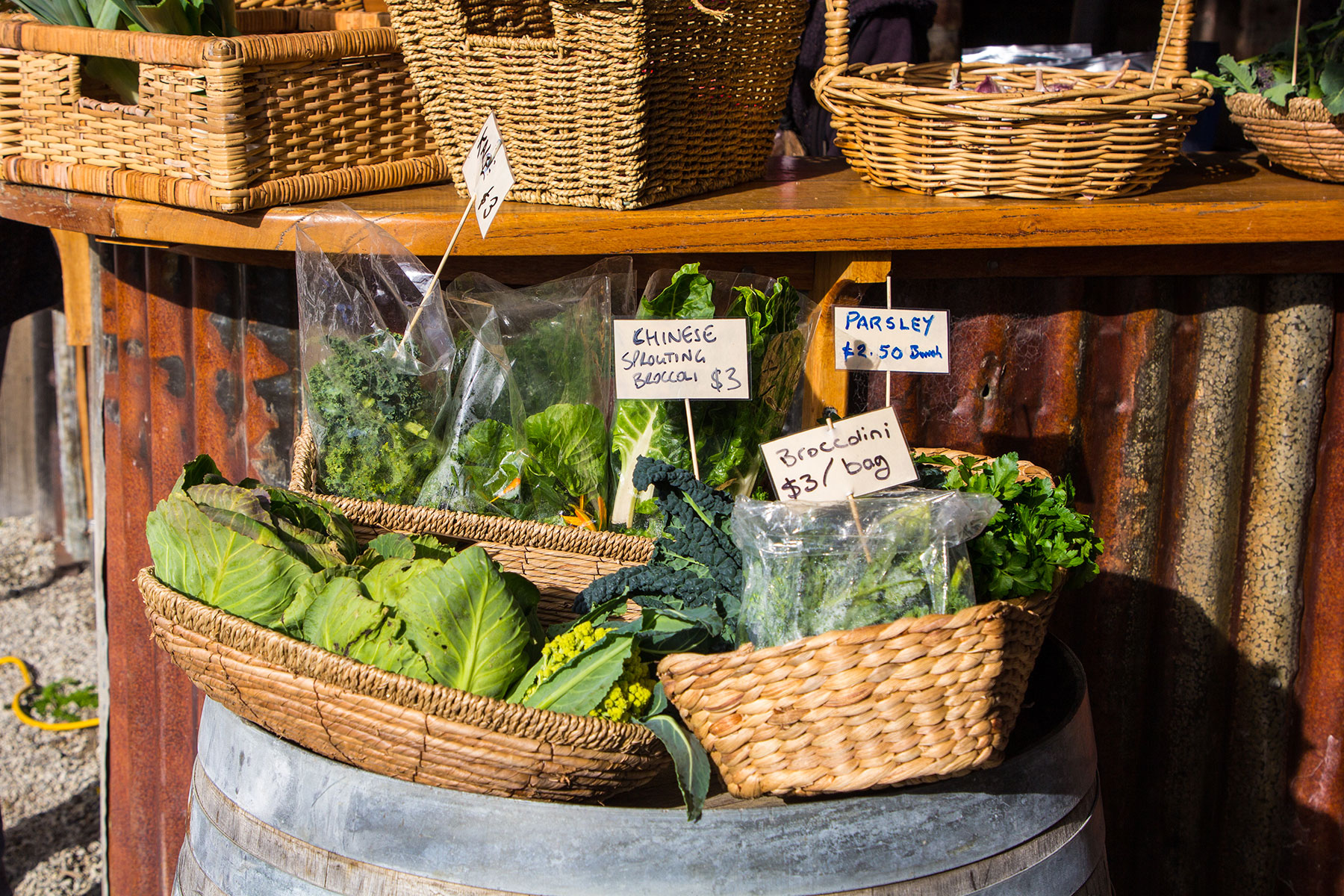
Another vanning staple is long-life milk which doesn’t need to be refrigerated until you open it.
When it comes to grog, bottles are heavy and can break. And if you attend outdoor concerts and the like, glass is not allowed in the concert area. Many good wines are available in casks these days. I recently discovered bagnums from Dan Murphy’s — two litres of wine in a little pouch with a handle which will travel very nicely and not leave marks on the inside of my fridge door.
Other bits and pieces
Ziplock bags have many uses. They save space in fridges and cupboards for leftovers and can act as a waterproof container when carrying bits and pieces — even mobile phones — in backpacks next to water bottles or when you go fishing.
If you’ll be using washing machines in caravan parks, start saving your gold coins. Another tip I picked up on a Facebook group I belong to is lightweight laundry sheets which weigh less and take up much less space that a box or bottle of OMO.
A repair kit is a good idea — a selection of glues, duct tapes, cable ties, ropes, sharp knife, lighter/matches and a multi-tool. And don’t leave home without a good first aid kit that contains basics such as band aids, pain killers, antihistamines and bandages. If you haven’t already, do a first aid course — knowledge can save lives.
Items that have multiple uses are the ones to look out for. When you’re travelling with kids, try to pack high entertainment-value for weight items: favourite dolls, tennis ball and cricket bat, army men, that kind of thing.
There’s nothing worse than heading off and realising you’ve forgotten a charger or cable for a particular electronic device. Make sure you can cover everyone’s device on both 240v and 12v power.
Outdoor essentials
Caravanning is predominantly a warm weather activity and you’ll spend most of your time enjoying the outdoors.
There are a few outdoor essentials that I reckon are non-negotiable.
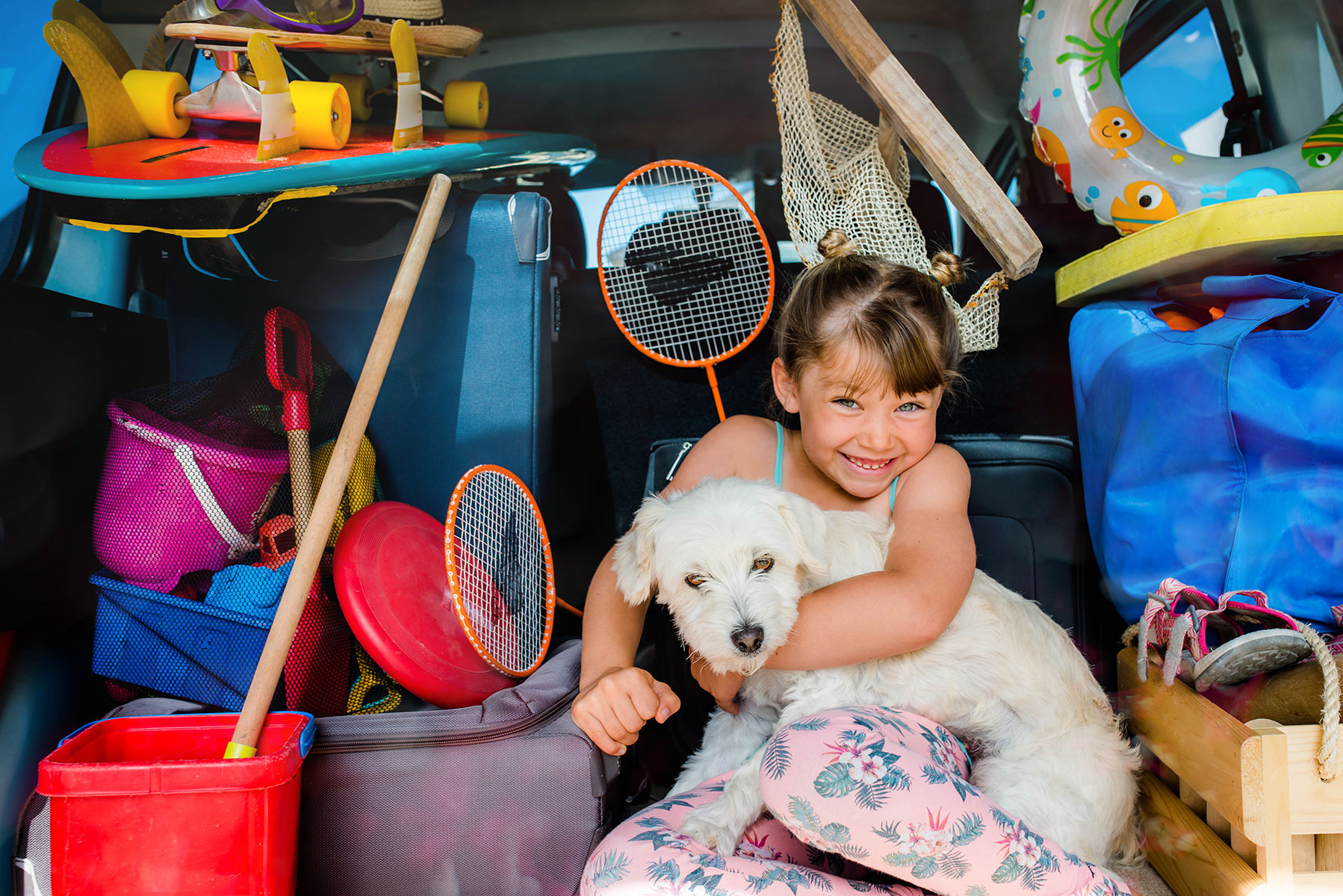
Chairs: This is like Goldilocks and the three bears. Each family member will need a chair that is comfortable for them. Some camping chairs are great for leaning back and relaxing, but when it comes time to dragging it up to the table to eat dinner, it’s just not upright enough. Others will have the right amount of support, but are not great for lounging around and relaxing. There are hundreds of options out there so try before you buy.
Table: As with chairs, another personal choice. It needs to be the right height for comfortable dining. Some have legs which shorten to become coffee table height, which is handy for happy hours.
Ground cover: Many caravan parks will have grass or a concrete slab, but when it comes to roughing it, you will want a large mat for your outdoor space. The ones that trap dirt and sand are great. You’ll probably want another mat at the step of your van too.
Cooking: A lot of vans these days come with a built-in barbie. However, most folks will carry their own Weber, Ziggy or other kettle barbecue which is also great for roasting. An induction hotplate that you can plug in outside is also a great investment.
Lighting: Can come in many forms — torches, lanterns, LED strips, solar — the list goes on.
Bucket: Has many uses. Don’t leave home without one.
Pests: Insect repellent is a must. There are also mozzie coils, bug zappers and citronella candles.
Annexe: These are heavy and take a long time to set up so unless you’re going to get the benefit from it, such as an annual holiday to the beach for two weeks, leave it at home. Shade screens attached to your awning to keep the sun off the fridge and van work well and are relatively inexpensive.
Tools and spares, a caravan hitch lock, wheel chocks, a chock pad for under your jockey wheel, portable clothesline, guy ropes, power/extension cords and hoses are other essentials for on or offroad travel.




